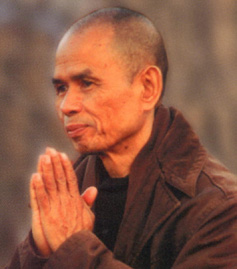|

Thich Nhat Hanh
Born in central Vietnam in 1926, Thich Nhat Hanh (pronounced Tick-Naught-Han) is a Buddhist monk (ordained in 1942),
a poet, Zen Master and peacemaker.
In 1961 he came to the USA to study and teach comparative religion at Columbia and Princeton Universities but in 1963
he returned to Vietnam to work for peace there.
He served as the chair of the Buddhist Delegation to Paris Peace Talks during the Vietnam war and was nominated by Martin
Luther King Jr. for the Nobel Peace Prize. After which he was barred from returning to Vietnam for voicing his views on peace
and he settled in France. Where he continued to work for peace and also helped aid the boat people in the Gulf of Siam.
(The Thai and Singapore governments shut down this effort.)
During the war he organized one of the most profound movements in the history of the non violence resistence. One project
was the rebuilding of clinics, schools and villages destroyed in the bombing carried out by lay people, nuns, and monks.
His teachings and writings of 'Mindfulness' are known throughout the world.
He is the author of more than thirty five books, including
'Being Peace' and 'Peace is Every Step', 'Living Buddha, Living Christ' in which he explores the parallels between Buddhism
and Christianity.
Thich Nhat Hanh continues to teach and write his message of peace.
Some Quotes by Thich Nhat Hanh:
If in our daily life we can smile, if we can be peaceful and happy, not only we, but everyone will profit from it. This
is the most basic kind of peace work.
In true dialogue, both sides are willing to change
People deal too much with the negative, with what is wrong. Why not try and see positive things, to just touch those things
and make them bloom?
Smiling is very important. If we are not able to smile, then the world will not have peace. It is not by going out for
a demonstration against nuclear missiles that we can bring about peace. It is with our capacity of smiling, breathing, and
being peace that we can make peace.
The practice of peace and reconciliation is one of the most vital and artistic of human actions.
When we come into contact with the other person, our thoughts and actions should express our mind of compassion, even
if that person says and does things that are not easy to accept. We practice in this way until we see clearly that our love
is not contingent upon the other person being lovable.
Back to Great Legacies of Peace
|



